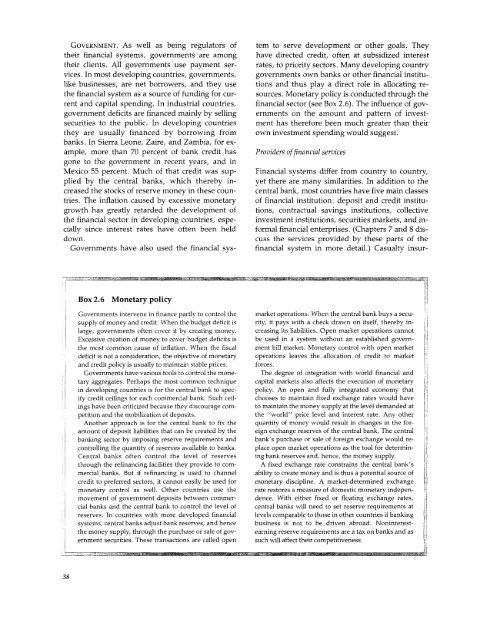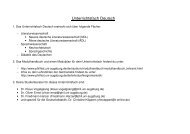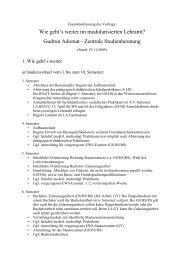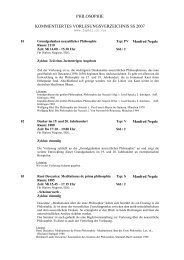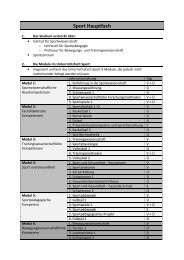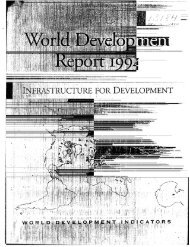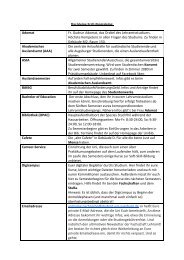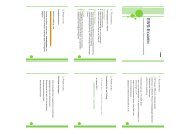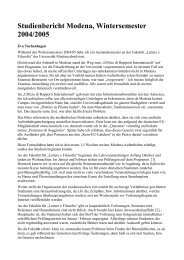Financial systems and development
Financial systems and development
Financial systems and development
Create successful ePaper yourself
Turn your PDF publications into a flip-book with our unique Google optimized e-Paper software.
GOVERNMENT. As well as being regulators of tem to serve <strong>development</strong> or other goals. They<br />
their financial <strong>systems</strong>, governments are among have directed credit, often at subsidized interest<br />
their clients. All governments use payment ser- rates, to priority sectors. Many developing country<br />
vices. In most developing countries, governments, governments own banks or other financial institulike<br />
businesses, are net borrowers, <strong>and</strong> they use tions <strong>and</strong> thus play a direct role in allocating rethe<br />
financial system as a source of funding for cur- sources. Monetary policy is conducted through the<br />
rent <strong>and</strong> capital spending. In industrial countries, financial sector (see Box 2.6). The influence of govgovernment<br />
deficits are financed mainly by selling ernments on the amount <strong>and</strong> pattern of investsecurities<br />
to the public. In developing countries ment has therefore been much greater than their<br />
they are usually financed by borrowing from own investment spending would suggest.<br />
banks. In Sierra Leone, Zaire, <strong>and</strong> Zambia, for example,<br />
more than 70 percent of bank credit has Providers of financial services<br />
gone to the government in recent years, <strong>and</strong> in<br />
Mexico 55 percent. Much of that credit was sup- <strong>Financial</strong> <strong>systems</strong> differ from country to country,<br />
plied by the central banks, which thereby in- yet there are many similarities. In addition to the<br />
creased the stocks of reserve money in these coun- central bank, most countries have five main classes<br />
tries. The inflation caused by excessive monetary of financial institution: deposit <strong>and</strong> credit institugrowth<br />
has greatly retarded the <strong>development</strong> of tions, contractual savings institutions, collective<br />
the financial sector in developing countries, espe- investment institutions, securities markets, <strong>and</strong> incially<br />
since interest rates have often been held formal financial enterprises. (Chapters 7 <strong>and</strong> 8 disdown.<br />
cuss the services provided by these parts of the<br />
Governments have also used the financial sys- financial system in more detail.) Casualty insurg<br />
~~~ x ;~~- d . :h-SF..AeC 1 KX_syEs=<br />
Box 2.6 Monetary policy<br />
Governments intervene in finance partly to control the market operations. When the central bank buys a secusupply<br />
of money <strong>and</strong> credit. When the budget deficit is rity, it pays with a check drawn on itself, thereby inlarge,<br />
governments often cover it by creating money. creasing its liabilities. Open market operations cannot<br />
Excessive creation of money to cover budget deficits is be used in a system without an established govern- I<br />
the most common cause of inflation. When the fiscal ment bill market. Monetary control with open market t<br />
deficit is not a consideration, the objective of monetary operations leaves the allocation of credit to market '<br />
<strong>and</strong> credit policy is usually to maintain stable prices. forces.<br />
Governments have various tools to control the mone- The degree of integration with world financial <strong>and</strong><br />
tary aggregates. Perhaps the most common technique capital markets also affects the execution of monetary<br />
in developing countries is for the central bank to spec- policy. An open <strong>and</strong> fully integrated economy that<br />
ify credit ceilings for each commercial bank. Such ceil- chooses to maintain fixed exchange rates would have<br />
ings have been criticized because they discourage com- to maintain the money supply at the level dem<strong>and</strong>ed at<br />
petition <strong>and</strong> the mobilization of deposits. the "world" price level <strong>and</strong> interest rate. Any other<br />
Another approach is for the central bank to fix the quantity of money would result in changes in the foramount<br />
of deposit liabilities that can be created by the eign exchange reserves of the central bank. The central<br />
banking sector by imposing reserve requirements <strong>and</strong> bank's purchase or sale of foreign exchange would recontrolling<br />
the quantity of reserves available to banks. place open market operations as the tool for determin-<br />
Central banks often control the level of reserves ing bank reserves <strong>and</strong>, hence, the money supply.<br />
through the refinancing facilities they provide to com- A fixed exchange rate constrains the central bank's<br />
mercial banks. But if refinancing is used to channel ability to create money <strong>and</strong> is thus a potential source of<br />
credit to preferred sectors, it cannot easily be used for monetary discipline. A market-determined exchange<br />
monetary control as well. Other countries use the rate restores a measure of domestic monetary indepenmovement<br />
of government deposits between commer- dence. With either fixed or floating exchange rates,<br />
cial banks <strong>and</strong> the central bank to control the level of central banks will need to set reserve requirements at<br />
reserves. In countries with more developed financial levels comparable to those in other countries if banking<br />
<strong>systems</strong>, central banks adjust bank reserves, <strong>and</strong> hence business is not to be driven abroad. Noninterestthe<br />
money supply, through the purchase or sale of gov- earning reserve requirements are a tax on banks <strong>and</strong> as<br />
ernment securities. These transactions are called open such will affect their competitiveness.<br />
38


